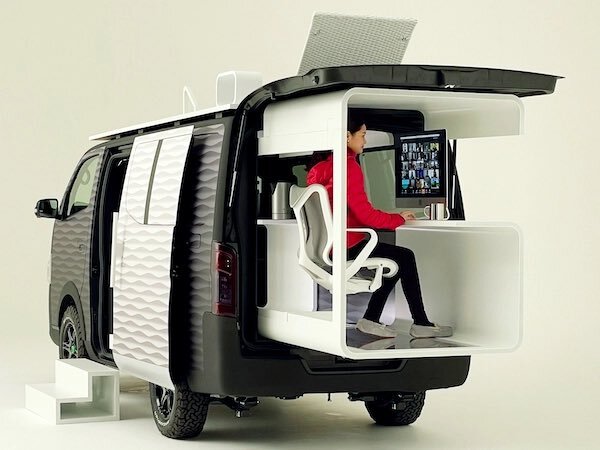(We originally posted this in 2019. You can read more of our original ideas in our archive.)
Problem: Working from home requires individuals to choose a singular spot to conduct all of their activities and business.
Solution: This business would work to create both “work from home” vehicles (cars, planes, boats, etc.) or optimized work from home rest stops. This tweet was initially inspired by Steve Jang, who posted about the Office Pod which is a new concept about a car designed for working from home.
This business would significantly benefit from some of the down-stream effects of working from home which have recently been revealed and studied by a variety of organizations and academic institutions including Newsweek and the Pew Research Center. Some specific highlights include:
Environmental effects: “When 3.9 million employees work from home at least half time, they reduce greenhouse gas emissions by the equivalent of taking more than 600,000 cars off the road for an entire year. Considering that 1 in 4 Americans are expected to work remotely in 2021 (approximately 39 million), that number jumps to 6,000,000 cars. With an estimated 13 to 27 million people working from home in coming years, remote work could reduce commuting miles by 70 to 140 billion every year!” as reported by FlexJobs
Monetary effects: “According to Owl Labs’ State of Remote Work report, remote workers earn $100,000+ per year more than two times as often as on-site workers. While 74% of remote workers earn less than $100,000 and 26% earn more, that’s compared to 92% and 8% of on-site workers, respectively.”
Enjoying Work From Home Lifestyle: “‘The demand for flexibility in where and how people work has been building for decades,’ the San Diego-based consulting firm headed by Kate Lister said in a research report. Before the crisis, surveys repeatedly showed 80% of employees want to work from home at least some of the time…. A survey conducted by PriceWaterhouseCoopers found that 83% of office workers would like to have the option to work from home at least once a week even if COVID-19 is no longer a threat to public health."
People are happier: “Despite a tumultuous year in 2020, remote workers report a Workforce Happiness Index of 75 out of 100, compared to 71 for in-office employees. And, remote employees are more likely to report being satisfied with their jobs than office-based workers (57% vs. 50%). All in all, those working from home reported more positive measurements on almost every question related to job satisfaction.”
I anticipate that in the future as working from home becomes more common, people will blend their “vacations” with “working from home” by doing both at the same time. A business that specializes in renting or selling reliable portable work stations with Wi-fi, space, electricity, and more would, I argue, create a boom in the vacation industry of the future.
At least in the US, the road-trip market is increasing quite significantly as Forbes describes.
According to the 29th annual Portrait of American Travelers survey by MMGY Global, a global marketing firm specializing in the travel, hospitality and entertainment industries. Since 2015, the survey has tracked a 64% increase in respondents reporting they have taken a road trip. And this year, two out of three travelers said they intend to take a road trip in the next 12 months.
This year's Portrait of American Travelers survey busts a few myths, beginning with the false assumption that road trippers are budget travelers. The average American household is spending about $5,000 on travel this year — about the same as last year. But there is a shift: today's road trippers are actually taking more vacations and spending more money on vacations in 2019 than those who are not taking a road trip.
My hunch is that this trend will continue, especially given the pandemic economy will not be going away anytime soon.
Monetization: Sales from selling, renting, or facilitating these experiences.
Contributed by: Michael Bervell (Billion Dollar Startup Ideas)





